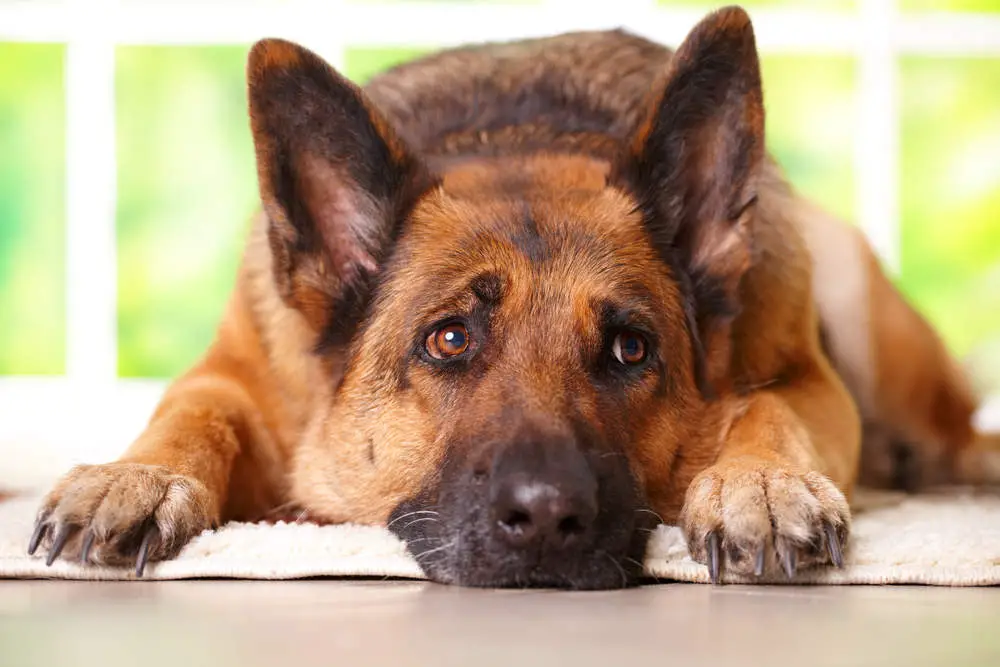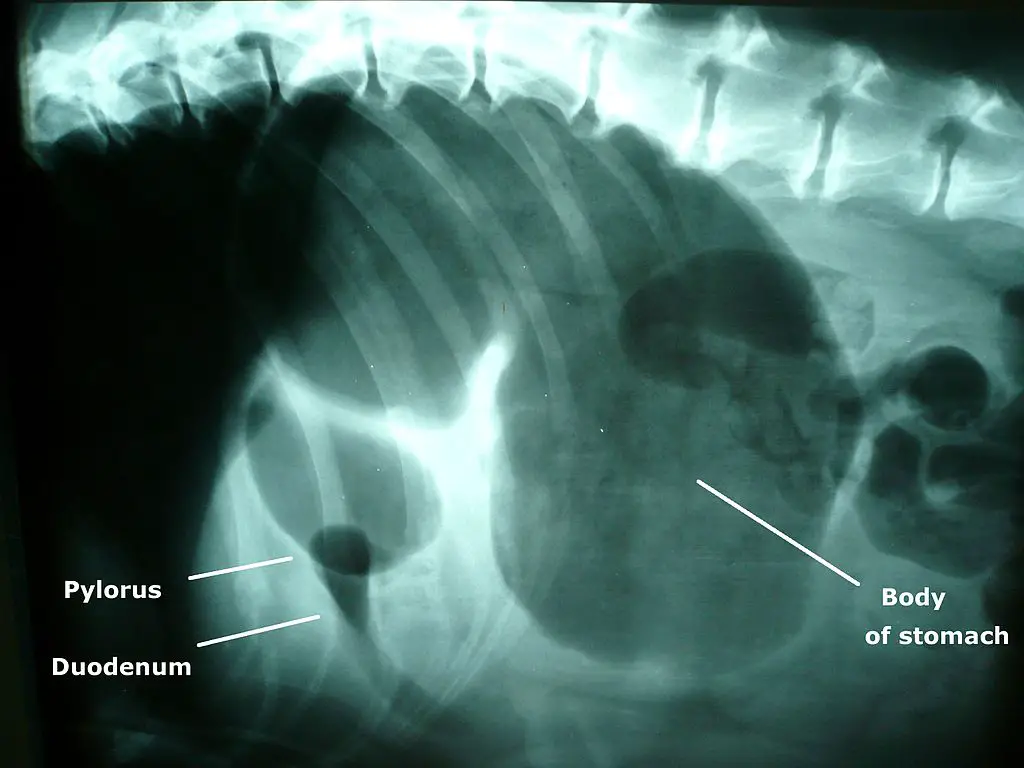
If you have a furry companion, you’ll be aware that doggos can go through a series of health problems. While all pooches may not catch medical issues easily, but German Shepherds are more sensitive.
A common disorder among German Shepherds is bloat, otherwise known as gastric dilatation-volvulus (GDV). If you have a German Shepherd or you are thinking of adopting one, you must understand this ailment beforehand.
Are German Shepherds prone to bloat? Yes, German Shepherds are prone to bloat. Bloat can affect any dog but large, deep-chested dogs such as German Shepherds, Great Danes, Irish Setter, etc are more likely to be affected. Bloating happens when the dog’s stomach expands due to a build-up of excess gas. It is often attributed to swallowed air. It might also twist which traps air, food and water in the stomach. It can also lead to low blood pressure, shock, internal organ damage and also death.
What Is Bloat In German Shepherds?
Bloat or gastric dilatation-volvulus (GDV) is a serious and life-threatening condition for big dogs like German Shepherds. Bloating occurs in the stomach and is related to swallowed air or the presence of food and fluid.
This condition happens when the stomach has an abnormal accumulation of air, fluids, and foam. A bloated stomach obstructs the veins in the abdomen.
The presence of excessive air blocks the circulation of water as well as food in the stomach. This causes twisting of the intestines and swelling in the stomach.
This health issue can lead to low BP, shock, and can permanently damage internal organs. A bloated pooch must be treated immediately. Otherwise, the combined effect can have a serious impact.
Related: Can German Shepherds Have Dwarfism?
What Causes Bloating In German Shepherds?
There are several underlying reasons why your GSD is bloated. It is also known the deep-chested dogs (like German Shepherds) are prone to bloating.
Genetics can also play a large role in causing your dog to bloat. The genetics determine susceptibility to bloat in German Shepherds.
While that might make just one of the reasons why your pooch is bloating, we have stated the possible causes of bloat.
- Stress and anxiety can be a major cause of bloat in German Shepherds.
- Shepherds who are older than seven years are at a higher risk of developing bloat.
- The pooch is not having adequate fluids and water.
- A raised food bowl can force the dog to swallow excessive air and hence lead to bloating.
- Eating fast and quickly may also be one of the reasons.
- If you are providing your canine companion with only one day a meal, the pooch is more likely to bloat.
- If your GSD indulges in heavy physical activity after a meal, the risk of bloating increases.
- The diet is a significant reason why your doggo is bloating. The pooch may bloat if you are only providing dry food and skipping wet foods.
- A lean-small German Shepherd has insufficient fat in the abdomen. This exposes them to mimic a deep chest, which gives rise to bloat.
- If you have a male dog, take greater care as they are more vulnerable to bloating.
Symptoms Of Bloating In German Shepherds
Knowing the symptoms is essential as it can help you to address and seek medical attention faster. You need to have a prompt response during a life-threatening condition like bloat.
Early medical treatment is the only way your German Shepherd can pass through this phase. To help you to identify this condition, we have accumulated all the possible symptoms of bloat.
- If your pooch is resisting to eat meals, this may be because of bloat.
- Restless and anxious behavior.
- Pale or off-color gums.
- German shepherds are active canines. If your shepherd has bloat, he will be disinterest in daily routines.
- Rapid and heavy panting.
- A protruding or large abdomen indicates bloat.
- Excessive drooling.
- If your GSD is making unusual sounds, they may be trying to tell you about the pain.
- Attempting to vomit frequently is one of the significant symptoms.
- Your dog is unable to stand due to weakness, maybe because he is bloated.
- A rapid heartbeat is one of the advanced symptoms of bloat.
- A loss of consciousness is also a serious symptom.
Related: What Age Do German Shepherd Puppies Ears Stand Up?
How To Prevent Bloating In German Shepherds
It is always better to prevent such conditions than bringing it to the stage of treatment. Keeping your German Shepherd healthy and fit should be your utmost priority.
There are many methods like prophylactic gastropexy and laparoscopic gastropexy. Both these methods are advanced and are carried out by a vet to reduce the risk of bloating.
By taking only a few preventive measures, you can ensure that your pooch never faces something like bloat.
Diet-Related
Since diet and food-related signs are the major causes of bloating, you should improve their eating habits. You can start by feeding your pooch at regular intervals.
Ensure that your dog is eating at least two-three times a day. Also, refrain from serving large portions at a time.
German Shepherds should consume a healthy and nutritional diet. Adding probiotics to their diet will enhance digestion and increase metabolism.
Give a good blend of wet foods and solid-dry foods. This will fasten the digestion and minimize the risk of blockage in the intestine.
Include only fresh foods in your German Shepherds’ diet. It is best to avoid food with preservatives and citric acid or even fermentable carbohydrates.
Other Preventive Measures
Let your dog indulge in some light activities after eating his meal. Physical activities, like running or playing, should be avoided.
Get a bowl that will allow your shepherd to gulp food slowly. Since feeding bowls have a large impact on health, choose carefully.
Take your German Shepherd for regular check-ups with the vet. Additionally, you can consult and keep anti-gas medicine for serious situations.
Provide your German Shepherd with plenty of water throughout the day. However, your dog should not intake too much water after a meal.
Related: When Do German Shepherds Stop Growing?
What Will The Vets Do?

Going to the vet is the best option if your dog is showing any symptoms of bloating. This condition should not be treated at home.
The vets will be initially performing diagnosis and then move on to treatment. The chances of a successful treatment depend upon how soon the condition was detected and treated.
Diagnosis
The first step the vet might take is conducting an X-Ray of the distended stomach. This process allows the vet to identify if the stomach has twisted or flipped abnormally.
Lab tests like an ECG, complete blood count, analysis of blood, and urine are done before taking the next step. These tests will set the future course of action in the treatment.
A few additional tests may be carried out to detect the presence of other diseases. The tests are for diseases like tumors, hemorrhage, diaphragmatic hernias, intestinal obstructions, splenic torsions, hypoadrenocorticism.
Diagnosis is an important part as it will help the vets to analyze the current state of your shepherd.
Treatment
The first thing the vet will do is stabilize your German Shepherd. To steady your pooch, the vet will basically decompress the stomach to release the pressure.
Decompressing involves taking a channel through the stomach. In a few cases, a hypodermic needle may be used on the abdomen on the side.
If your shepherd is the advanced stage of bloat, a shock therapy may be carried out for stabilization treatment. If the decompression process is unresponsive, the vet will prepare for immediate surgery.
The vet will use antibiotics to aid the treatment. During the treatment, the weight and rate of urine flow will be monitored closely.
A German Shepherd who has survived the treatment is prone to relapse. To prevent the bloat from reoccurring, the treatment will conclude with a gastropexy surgery.
Related: Can German Shepherds Be Left Home Alone?
To Sum It Up
Bloat or GDV is a very serious condition, and hence you should take all measures to prevent it. Unfortunately, these brave German Shepherds are prone to bloating.
If you own one, you should be well accustomed to their health irregularities. Never ignore any unusual activities of your GSD.
Even with susceptibility to such diseases, German Shepherds are considered to be one of the best breeds. If you identify any symptoms noted above, it is best to take your dog to a vet for consultation.
